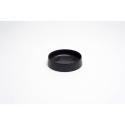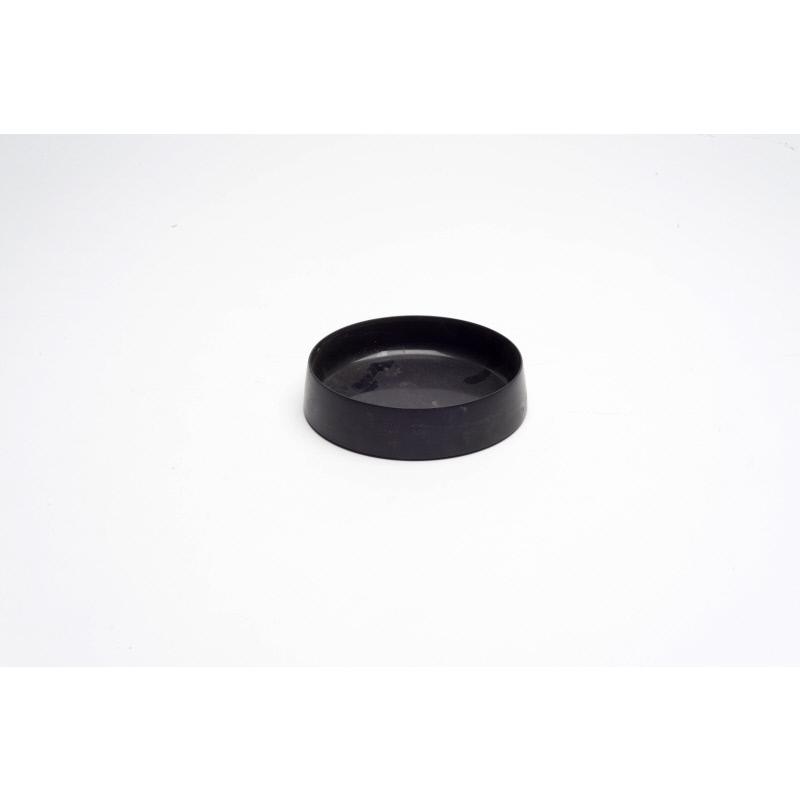Dish
Classification(s):
Plastic
Date: c.1951 - 1976
Manufacturer: Torben Ørskov & Co (Danish, founded 1953)
Designer: Kristian Solmer Vedel (Danish, 1923 - 2003)
Dimensions:
36 × 135 mm (3.6 × 13.5 cm)
Medium: Plastic, melamine
Object number: G458B
See Also
Place of Production:Denmark
DescriptionMelamine plastic dish in dark brown/black. Design by Kristian Vedel, manufactured by T Ørskov of Denmark.
ProvenanceThis object was originally acquired for the Inner London Education Authority’s (ILEA) ‘Circulating Design Scheme’ collection.
The collection was instigated by the London Country Council (later the Greater London Council) and the Council of Industrial Design (COID). The collection’s original purpose was concerned with the teaching and dissemination of modern, ‘good design’.
The collection was established in 1951/52 as the ‘Experiment in Design Appreciation’, later renamed the ‘Circulating Design Scheme’.
The Circulating Design Scheme lent boxed showcases to London schools. The showcases contained handling objects, material samples and interpretation on a specific subject.
COID withdrew its involvement in the Scheme in 1957. After which time, it was managed exclusively by the London County Council from 1957-1963.
After the administrative restructuring of London authorities, the Scheme was jointly managed by the Greater London Council and the Inner London Education Authority (ILEA) from 1963 – 1976.
The Scheme was operational until 1976 when the collections were withdrawn from circulation. ILEA was abolished in the late 1980s and the collection was donated to Camberwell College of Arts in 1989/90.
ILEA was responsible for secondary and tertiary education in the inner London boroughs, this included Camberwell.
The collection was instigated by the London Country Council (later the Greater London Council) and the Council of Industrial Design (COID). The collection’s original purpose was concerned with the teaching and dissemination of modern, ‘good design’.
The collection was established in 1951/52 as the ‘Experiment in Design Appreciation’, later renamed the ‘Circulating Design Scheme’.
The Circulating Design Scheme lent boxed showcases to London schools. The showcases contained handling objects, material samples and interpretation on a specific subject.
COID withdrew its involvement in the Scheme in 1957. After which time, it was managed exclusively by the London County Council from 1957-1963.
After the administrative restructuring of London authorities, the Scheme was jointly managed by the Greater London Council and the Inner London Education Authority (ILEA) from 1963 – 1976.
The Scheme was operational until 1976 when the collections were withdrawn from circulation. ILEA was abolished in the late 1980s and the collection was donated to Camberwell College of Arts in 1989/90.
ILEA was responsible for secondary and tertiary education in the inner London boroughs, this included Camberwell.
NotesBorn in Denmark, Kristian Vedel was an Industrial Designer and a member of the Scandinavian Design movement. In the late 1940s, Vedel was the Chairman of the Danish Furniture Designers, he also lectured at the School of Arts, Crafts and Design in Copenhagen form 1953-56. His output is characterised by a consideration for the ergonomic and functional elements of a design, particularly exploring materials such as wood and plastic.







